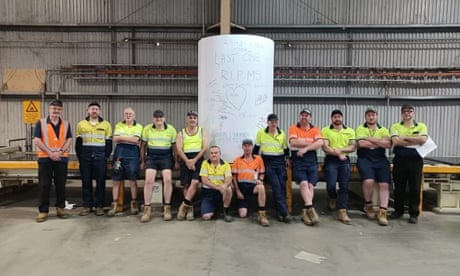- by foxnews
- 02 Feb 2025
Australia’s white paper industry is dead, leaving rural communities to pick through the pulp
Australia’s white paper industry is dead, leaving rural communities to pick through the pulp
- by theguardian
- 16 Feb 2023
- in news

For Pete Henry, who has worked at the Maryvale paper mill in Victoria's Latrobe Valley for 42 years, there was no specific time when the decline in white paper began.
"It's been happening for years," he says. He believes the M5 machine "wasn't making enough money for the company".
The M5 occupies a shed nearly half a kilometre long, turning forest pulp into tonnes of Reflex white copy paper daily. Last financial year it produced 116,000 tonnes of copy paper for the domestic market, plus 88,000 tonnes for export.
In December it was switched off indefinitely. Workers signed the final roll with "last one" and "RIP M5". The mill produced its last ream of copy paper in January.
Thirty-seven workers were stood down on full pay but the decision left up to 200 jobs at the mill - the biggest employer in the Latrobe Valley - insecure.
On Tuesday, Opal announced it would close the M5 and cease Reflex paper production permanently. Its packaging lines of brown kraft paper and paperboard will continue.
"There's a lot of angst," Henry says. "The people off M5 have been stood down with pay."
Reflex commands 80% of Australia's white copy paper market, but consumption has halved in the past decade, with further decline predicted. The digital transformation of workplaces and universities slowed consumption, and Reflex's use of what is known as "high conservation value" native timber resulted in it losing its Forest Stewardship Council accreditation, prompting thousands of businesses to sign an "ethical paper pledge" to boycott it.
Reflex manufacturer Opal says the M5 shutdown is due to a series of court rulings against its supplier VicForests, the state-owned logging enterprise. In a statement to shareholders on Tuesday, it said its decision to close was a "response to this sudden and unexpected suspension of supply".
In a statement to Guardian Australia, Opal said the closure was an "unplanned situation" and that it would work with unions and its employees to finalise redeployment options and redundancy packages for affected staff.
Under Victoria's Forests (Wood Pulp Agreement) Act, 350,000 cubic metres of native hardwood pulplog is guaranteed a year at fixed prices to Opal. The company is obliged to buy at least 85% of that guaranteed allotment until 2030.
But the supreme court has banned VicForests from logging Victoria's Gippsland and central highlands forests without first conducting full surveys of logging coupes to check for the presence of endangered species, and without including buffers for wildlife habitat.
Along with bushfires and deforestation, these rulings halted operations, leaving uncertain futures for timber harvest and haulage contractors. Logging contractors, retained on stipends, are finding it difficult to plan for the transition out of native logging. The Victorian government has a buy-back scheme for machinery used in logging but it is geared toward a transition deadline of 2030. That does not help contractors who are struggling now to pay the bills.
Opal says the court rulings have left the M5 without the wood pulp needed to produce paper. But critics of the company say that does not tell the full picture, which is that the market for copy paper has been in decline.
"It's a false dichotomy of jobs versus environment, a culture war that the company is stoking because it doesn't want to take responsibility for something it hasn't planned for," says lawyer Bronya Lipski, who grew up in the Latrobe Valley and now works as policy and advocacy manager at Environment Victoria.
"Opal has known for years that paper demand is declining and that state forests have a range of species facing extinction."
The company uses recycled or plantation wood fibre in some of its operations. Opal did not respond directly questions about whether it had been planning to close M5 before the supply shortfall, but said its focus now was to "strengthen its core strategy as an integrated manufacturer of cardboard fibre packaging in Australia and New Zealand".
Chris Taylor, a forestry researcher with the Australian National University, says plantation timber "can replace VicForests shortfalls multiple times over".
"Victoria produces on average around 2.5m cubic metres of hardwood plantation pulplog per annum," he says. "Most is exported."
Plantation blue gum grown in western Victoria is bought by Nippon Paper Group - the owner of Opal - and exported.
Mill workers believe Opal "isn't interested in sourcing timber from anywhere else", Henry says. "They're using VicForests as an excuse for something that wasn't making a profit."
Steve Dodd, secretary of the Gippsland Trades and Labour Council, believes the company is taking refuge in the court decision. "My understanding is they can't sell paper and have stockpiles in warehouses. They see [the court rulings] as a golden opportunity to shut M5 which they were going to do anyway."
Under its previous operator, the Maryvale mill planned to move to 100% plantation sourced fibre by 2017. Pulpmills globally are shedding unprofitable paper lines and regearing towards packaging cardboard, as online trade boosts demand.
Asked whether it had planned to close M5 before the court rulings, an Opal spokesperson said this was an "unplanned situation" and that: "It is now important to re-set the Maryvale Mill over the long-term as a sustainable, profitable and focused packaging manufacturing site within the integrated Opal business."
The impact on jobs from the potential closure of the mill would not be restricted to Maryvale. According to the Victorian auditor general's office, downstream wood industries "could not operate financially without [VicForests] pulp log sales".
Sarah Rees, a conservationist who served on the government's forest industry taskforce and the forest stewardship council, says it could lead to "a house of cards collapse".
"Many industries depend on this oversubsidised state-industry complex," Rees says. "Taxpayers subsidise the logging and the companies buying the logs. Even so, VicForests recorded a $54m loss to Victorians last year alone."
Plantation farmers say the state undercuts plantations by handing VicForests and customers like Opal a free primary resource - 1.8m hectares (4.5m acres) of native forest.
Hardwood grower John Woodley says plantations have been "competing directly with government agencies for market share".
"It's impossible to get reasonable returns when selling into the same markets as government-sourced produce," Woodley says.
The Victorian government promised a $120m investment into the plantation timber industry to shore up supply, but Chris McEvoy, managing director of sawmill and plantation company Radial Timber, says that funding hasn't materialised. Nor has a reformed carbon trading scheme, which would allow plantation timber growers to generate credits.
"When carrots are dangled and nothing's done, people are waiting for the government to end uncertainty before putting trees in the ground," McEvoy says.
A spokesperson for Victoria's agriculture minister, Gayle Tierney, said the Victorian forestry plan was "providing more than $200m in business, worker and community support to help the native timber industry transition".
Industry transitions, or shutdowns, have been raining on the Latrobe Valley for the past decade. Many workers at the Maryvale mill only joined recently, Henry says, after being laid off from the Hazelwood Power Station, which closed in 2017.
Gippsland's other big employers - the Carter Holt Harvey sawmill, the Saputo Dairy Australia factory at Maffra and the Heyfield timber mill - have also either closed or are in doubt , leaving workers to move from one obsolescent industry to the next.
"Everybody's become an expert on transitions," Dodd says. "They all have conferences and write reports. But we haven't seen any of those people on the ground."
- by foxnews
- descember 09, 2016
Disney reveals fate of closed Star Wars hotel
The building that was formerly home to the Star Wars: Galactic Starcruiser at Walt Disney World in Orlando, Florida will be repurposed, the company confirmed to local media earlier this week.
read more


